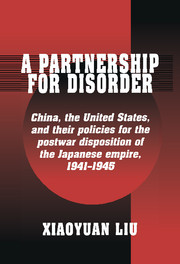 A Partnership for Disorder
A Partnership for Disorder Book contents
- Frontmatter
- Contents
- Acknowledgments
- Note on romanization
- Abbreviations
- Introduction
- 1 The making of an alliance
- 2 The issue of postwar Japan
- 3 China's lost territories
- 4 Korea's independence
- 5 The road to Cairo
- 6 A divisive summit
- 7 Yan'an and postwar East Asia
- 8 Diplomacy without action
- 9 Erosion of a partnership
- 10 The Manchurian triangle
- 11 Bargaining at Moscow
- 12 Epilogue: The crisis of peace
- Appendix I Guiding Plan for Helping the Korean Restoration Movement
- Appendix II Two Chinese documents of the Cairo Conference
- Bibliography
- Index
12 - Epilogue: The crisis of peace
Published online by Cambridge University Press: 20 October 2009
- Frontmatter
- Contents
- Acknowledgments
- Note on romanization
- Abbreviations
- Introduction
- 1 The making of an alliance
- 2 The issue of postwar Japan
- 3 China's lost territories
- 4 Korea's independence
- 5 The road to Cairo
- 6 A divisive summit
- 7 Yan'an and postwar East Asia
- 8 Diplomacy without action
- 9 Erosion of a partnership
- 10 The Manchurian triangle
- 11 Bargaining at Moscow
- 12 Epilogue: The crisis of peace
- Appendix I Guiding Plan for Helping the Korean Restoration Movement
- Appendix II Two Chinese documents of the Cairo Conference
- Bibliography
- Index
Summary
At noon, on 15 August 1945, the Japanese people listened to Emperor Hirohito's voice over the radio announcing Japan's acceptance of the Potsdam Proclamation. Japan's military defeat was complete. Nevertheless, Tokyo's decision to surrender in mid-August fixed the timing of peace and the balance of military power in East Asia under which peace would unfold. For policymakers in Washington and Chongqing, Japan's surrender came either too late or too soon: Japan stumbled too long in the Pacific war to prevent the Soviet Red Army from pouring into Manchuria and Korea, yet its resistance against the Russians in these areas collapsed too rapidly to allow the American and Chinese military forces to play a role.
On Victory in Japan day in East Asia, while most people were intoxicated by the coming of peace, Harry Truman and Chiang Kai-shek were filled with anxieties about the future. On 14 August, after receiving the news that Emperor Hirohito had decided to surrender, President Truman talked to a cheering crowd through a loudspeaker on the north portico of the White House. Aside from hailing the triumph of the United Nations coalition over the Axis powers, the president exhorted his audience to complete the task of implementing free government in the world, referring to an “emergency … as great as it was on December 7, 1941.” Across the Pacific, Chiang Kai-shek's “victory broadcast” to the Chinese people was no more optimistic.
- Type
- Chapter
- Information
- A Partnership for DisorderChina, the United States, and their Policies for the Postwar Disposition of the Japanese Empire, 1941–1945, pp. 287 - 305Publisher: Cambridge University PressPrint publication year: 1996
